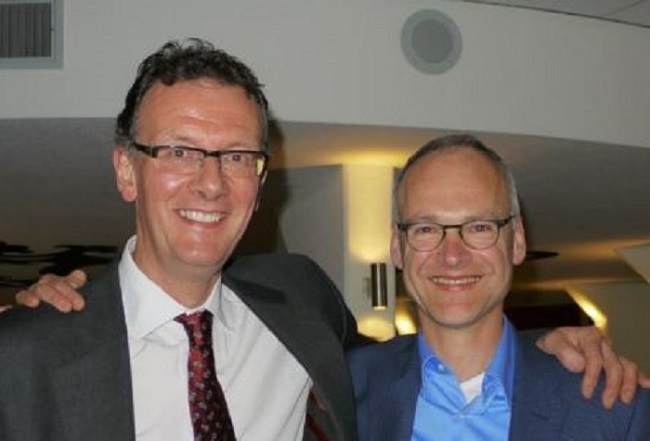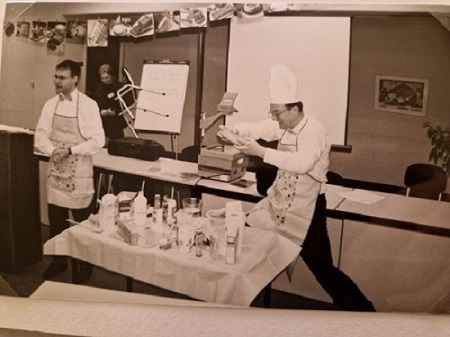Written by: Paula Arellano Geoffroy
Published: 6 October 2023

Many SENSE members have benefitted over the years from the workshops and conferences for translators, interpreters and editors offered by Teamwork. Founded by Marcel Lemmens and Tony Parr in 1993, Teamwork has trained more than 3,500 professionals in the last 30 years. In this interview, Marcel and Tony tell us how their initial idea came to be and why the journey is now coming to an end.
It seems that you both share a love for languages – Marcel studied English at Tilburg and Nijmegen and Tony studied Dutch and French at Cambridge. Can you tell us a bit about your backgrounds and how you became professional translators?
Marcel: It was a bit of a coincidence, really. I was working as a teacher at a secondary school back in the 1980s when I realized that this was not a job that I was prepared to do for the rest of my life. I’d been in teaching for about four years and was enjoying the work when a colleague of mine – an excellent teacher – suddenly broke down from one day to the next. He never went back to teaching again. That’s when the penny dropped and I thought that I didn’t want that to happen to me. So I applied for a part-time job as a translator (‘vertaler/correspondent’ is what it said in the job vacancy) with a cigarette company in Zevenaar. I worked there for three years.
In the meantime, I graduated from the university of Nijmegen and also worked for the English publisher Collins both in Birmingham and in Doetinchem, where I lived at the time. The manager of the Collins Cobuild Dictionary had asked me to help his team of lexicographers design the grammar coding in the centre column of the first edition of the dictionary. It was one of the most thrilling jobs I have ever done. When I did a talk about my ideas on grammar coding in learners’ dictionaries at a lexicographers’ conference in Leeds, I met one of the two directors of the Translation Academy in Maastricht and he asked me if I could temporarily replace one of his lecturers who was on maternity leave. It seemed like a good idea. And that’s where I met Tony.
Tony: There was no proper study counselling at the bog-standard comprehensive school I went to in Oxford, and so – when it became clear that I didn’t have the right A-levels for doing a degree in maths – I decided to simply continue at university with the subjects I happened to be slightly better at at school: French and Latin. That was a big mistake. I dropped Latin as soon as I could, but also quickly became disenchanted with French. Studying French at Cambridge was a form of factory farming: the lectures were like a ‘megastal’ (a huge cattle shed) for students. I decided the time had come to do something different and, because my mother was a Flemish-speaking Belgian, it was Dutch I took up rather than Norwegian or Romanian.
Dutch was my saviour. It was brilliant. Just a small group of students, and lectures were ‘gezellige’ chats over coffee. I’m still in touch with the Dutch lecturer from my student days and will in fact be paying her a visit next week! However, despite having a go at modern and medieval Dutch literature, I felt rather embarrassed at the end of the course at my lack of good spoken Dutch. So I spent a summer working as a waiter in a hotel just outside Groningen and, after graduating, applied to all the Dutch universities for a job as a ‘studentassistent’ with the English department. Groningen was keen to have me, and so I spent two years there teaching drama classes to second-year students. It was great, but I didn’t really know much about English language or literature, so I thought I should move on.
I got myself a job as a translator with Vertaalbureau Bothof in Nijmegen (and just about every single English translator I have met in the Netherlands seems to have worked for Bothof at some point), where I spent three years under the tutelage of a truly brilliant translator, who taught me the tricks of the trade. I then spent a further five years working as an in-house translator for NMB Bank (now known as ING), before someone I met at a party invited me to apply for a job teaching translation in Maastricht. And that’s where I met Marcel.
How did the idea of creating Teamwork start?
Marcel: Teaching translation was great, but the vast majority of my colleagues in Maastricht had no practical experience as translators. That meant spending a lot of time translating newspaper articles, which were not only far too difficult for the students, but also totally unrepresentative. I had never been asked to translate a newspaper article when I’d been working as a translator.
Tony: Neither had I.
Marcel: And there were other things that grated. Not just the rather literary approach to translation, but the haphazard way in which texts were selected, the blindness to the type of material (often poor-quality) that real-life translators worked with, the marking system, and so on. Tony was a kindred spirit and we soon set about producing a handbook for student translators based on a totally new approach to translation techniques: ‘Handboek voor de vertaler Nederlands-Engels’.
Tony: At some point in 1993, we decided to run a translation workshop for former students of Maastricht. It was very popular – probably something to do with the fact that we offered our ‘workshoppers’ a slice of local ‘vlaai’ (from Mathieu Hermans, of course) during the coffee break.
Marcel: So we did another couple of these workshops and opened them up to all comers. To our surprise, we found that people were willing to get up in the middle of the night and travel all the way from Enschede to Maastricht to attend a translation workshop. Never had our ‘flabber’ been so ‘gasted’.
Tony: It wasn’t long before we decided to move the venue to Utrecht, which was of course far more convenient for people coming from other parts of the country. And we gradually professionalized the way we worked, bringing in subject specialists and experienced translators from all sorts of different fields.
Did you become SENSE members at that time as well?
Tony: Yes, I joined SENSE in 1995, and Marcel joined a couple of years later. I can remember doing a number of workshops for SENSE members – for example, ‘Dunglish for beginners’ and other workshops on editing. We also did a talk called ‘Cookery for translators’ during which we outlined the thinking behind what was then our new handbook. This involved dressing up as chefs and doing disgusting things with flour and eggs.
It can’t always have been easy to run a successful business for 30 years. How has this journey been for you?
Marcel: For a long time, we were more or less the only people running workshops for professional translators. Things changed in 2009, when the government decided that interpreters in particular needed to work on a more professional footing. There had been a number of scandals involving court interpreters, and these led to the enactment of the Wet beëdigde tolken en vertalers, which placed an onus on registered translators and interpreters to undertake continuing professional development (CPD) on a regular basis. The number of operators offering courses for translators and interpreters mushroomed – a lot of them have since disappeared, mind.
Tony: Although we made it our business not to offer workshops especially for people looking to amass CPD points (and many of the new courses took the form of webinars given by subject specialists rather than hands-on translation workshops), the new system did of course affect our work in that it diluted the training market. We had previously branched out from English into other languages, but over the years we found that the number of takers for other languages began to decline. This first affected less common languages such as Russian, Portuguese, Turkish and Italian, but we gradually started to find it difficult to attract enough people even for French and German.
Marcel: English has never been a problem, though. English remains the backbone of the translation market.
Tony: And then came Covid.
Marcel: We were in the process of planning our last conference when Covid hit the Netherlands. We had to shut down everything for some time. After a while, we started offering in-person courses again, but the first few of these were subject to all sorts of restrictions and it was also clear that a lot of people were not prepared to travel or to sit in a room with other people, even if they were placed a long way apart.
Tony: We also decided fairly early on that we weren’t interested in going online. The type of courses we do are aimed at participation: there’s lots of discussion and interaction. I attended a few webinars to see how they worked and a lot of them proved to be no more than talking heads on Zoom, sometimes accompanied by old-fashioned PowerPoint slides (which often stayed on the screen for minutes at a time). It was clear that online courses needed a totally different approach – and a huge investment in technology.
Marcel: So we sat it out. The conference never came to fruition, but we got back to our traditional in-person courses in 2022.
So why are you closing down?
Tony: We’re both getting on. I’ll be 68 in January and Marcel turned 67 in September. I started receiving my state pension last year, after 42 years in the translation business. It’s time to call it a day.
Marcel: We’ve seen the translation market shrink and change in recent years. It’s clear that machines are going to take over part of the bulk market. There’s still going to be a call for ‘thinking translators’ – people who can use input in one language to produce a text in another language that appeals to readers and doesn’t read like a translation.
Tony: After 30 years, we think that we’ve said all we need and want to say: it’s not about translating all the words, it’s about producing good text.
Do you have any future projects?
Tony: For me, the future is going to involve even more rowing than I’m doing at the moment, as well as lots of travel and pottering around in the garden. The main thing is being free from diary commitments. It’s great not having to work.
Marcel: I still enjoy translating and editing, but more and more of my time these days is taken up with writing. In part, that’s copywriting for clients, but I’m also doing lots of original writing. I published a book called ‘Als je BGRPT wat ik BDL’ in 2020 (full of writing tips) and have just completed a new book called ‘Een andere kijk op lezen’. It dispels a number of myths about reading and about the much-heard claim that ‘no one reads any more’. My view is that the focus should be on reading at primary school. And it doesn’t matter what children – and teenagers – read, as long as they read. Reading should be fun, not a burden.
|
Blog post by: Paula Arellano Geoffroy Website: paulaarellanogeoffroy.com LinkedIn: paula-arellano-geoffroy |


